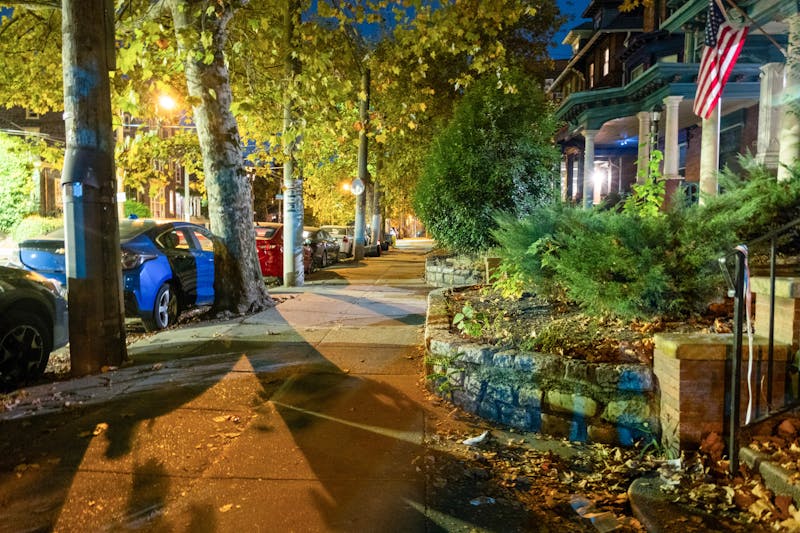
I admit it: There are a great number of things that I do not understand. While your personal appraisal of that number may vary depending on how long you have been reading my columns and your location in the political spectrum, what I don't understand today is bigotry.
No doubt it is because I suffer from the dual afflictions of youth and liberalism, but I don't understand how in 2003 a United States senator can equate homosexuality with incest and beastiality, or how in a debate the Penn College Republicans can echo those sentiments. I don't understand how allegedly pro-life politicians can oppose adoptions by loving parents. And I really don't understand how, in a society in which marriage licenses are handed out as television game show prizes, allowing two loving people to wed threatens the sanctity of marriage.
When push comes to shove, the real reason that conservatives oppose gay marriage is that they believe homosexuality is immoral. Thanks to a little thing called the First Amendment, they are certainly entitled to their religious beliefs. However, law in our nation is founded on codified rights and responsibilities, not the particulars of any religious doctrine, and besides that, the topic at hand is not religious but rather civil marriage.
Despite this, with the maturity of 9-year-old boys in a tree house, conservatives aren't letting down the rope ladder. Apparently, letting other kids into their clubhouse would somehow make marriage less special for them. Like I said, I just don't get bigotry.
This situation, though, is not without glimmers of hope. The Supreme Judicial Court of Massachusetts recently ruled in favor of Julie and Hillary Goodridge, who had, along with other gay couples, sued the state for marriage licenses. The court declared, "the right to marry means little if it does not include the right to marry the person of one's choice, subject to appropriate government restrictions in the interests of public health, safety and welfare."
The conservative reaction has been to promote Defense of Marriage Amendments, both in Massachusetts and to the federal constitution, to legally define marriage as a union between a man and a woman. This is, though, a tacit admission that the 1996 Federal Defense of Marriage Act (which said much the same thing) is unconstitutional.
And it is. The flawed logic of gay marriage opponents -- that people other than the consenting adults in question should have a say in who weds whom -- is the same that prohibited interracial marriage. Only in 1967, in Loving v. Virginia, did the Supreme Court strike down anti-miscegenation laws, because then, as now, the 14th Amendment is supposed to guarantee all citizens equal protection of the law.
One could use the same principle to argue for opposite-sex housing alternatives on campus. You must ask yourself why the existing policy is in place; it's certainly not so that students won't pair off -- we all know the frequency at which that happens anyways -- although perhaps the administration is unfamiliar with the term "sexile."
Rather the rule seems to be to provide the majority heterosexual student body with comfortable housing arrangements instead of the potentially awkward situation of living with a person of the gender to which one is attracted. After all, even liberals like me can have a sense of modesty. A gay male student might feel more comfortable living with women, and that is a preference that the University should accommodate. In short, these comforts and protections that University rules afford me and others are not available to LGBT students, and that is wrong.
Overall, Penn's record on lesbian, gay, bisexual and transgender rights is not too bad. In 1979, Penn began to enforce the new sexual orientation plank in its anti-discrimination policy. It then extended benefits to same-sex partners in 1994. However, 25 and 10 years later, respectively, while the Code of Student Conduct assures that membership in the Penn community affords the right to non-discrimination on the basis of gender and sexual orientation in academic life, there is still progress to be made in terms of residential life. Now is the right moment for Penn to take another step forward.
Realistically, housing is likely not the biggest issue that LGBT students will face, for the bigotry inside our ivied walls is still less than in America at large. Why then provide a housing alternative along the lines of the Undergraduate Assembly's proposal? Because while I may not understand it, bigotry still survives. College students have enough to deal with as is, and making life just that much easier by providing students a comfortable place to call home is the right policy for any college.
But even beyond that, there's a principle at stake: Both Penn and America as a whole ought to provide their gay citizens the same statutory protections that they provide everyone else, and thereby live up more fully to our principles. How's that for a resolution for 2004? Kevin Collins is a sophomore Political Science major from Milwaukee, Wis.
The Daily Pennsylvanian is an independent, student-run newspaper. Please consider making a donation to support the coverage that shapes the University. Your generosity ensures a future of strong journalism at Penn.
DonatePlease note All comments are eligible for publication in The Daily Pennsylvanian.







